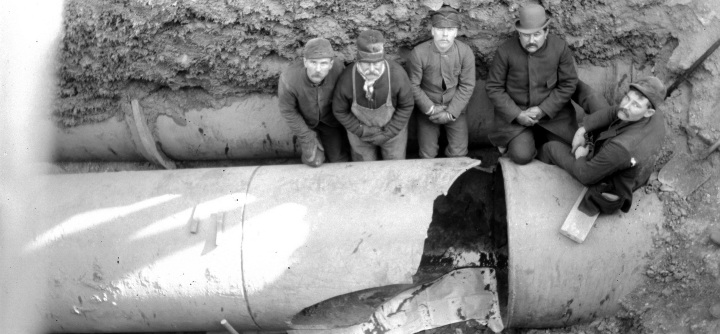Water Main Breaks
For reporting water and sewer emergencies such as water main breaks, call the Water Emergency Hotline open 24 hours a day: 215-685-6300

Background
There are more than 3,000 miles of water mains buried beneath Philadelphia's streets - more than enough pipe to connect Philadelphia to Los Angeles. Imagine driving from here to California every year, checking the buried mains for leaks or problems that could lead to breaks. Philadelphia Water Department crews spend hundreds of hours in the field making sure our mains are functioning correctly and responding to reports of leaks.
What To Expect When A Water Main Break Occurs
Main breaks can cause a loss of water pressure or even temporary loss of service as the main is shut down to isolate the emergency. Most interruptions to water service are fixed within six to eight hours. In some cases, such as water main breaks that occur in the middle of the night, water is usually restored by the following day. Affected customers are notified with a door hanger on the front door of the property.
Repairs to water service can allow sediment and debris into pipes. Here are some tips for clearing debris from your water pipes after street repairs have been made:
- Run your cold water faucets for several minutes in order to release air and remove debris from the system.
- Use bathtub, laundry faucets, and hose bibs when possible for flushing your system, as they generally have a larger capacity and do not have aerator screens to trap debris.
- Clean faucet screens to remove debris that might clog the water fixture.
Why Water Mains Break
Most of the water mains in Philadelphia are made of cast iron, which makes them affordable and reliable. These water mains can last a long time if they do what they were made to do: transport water from one place to another. Engineers knew how to design good quality cast iron mains, how to design distribution systems made up of mains, and how to properly construct and protect those systems. Eventually, the condition of the water main and its surroundings can lead to cracks, joint failures or more serious breaks. This could happen after 200 years; most often it happens after 100 years, but sometimes within only 50 years. Ideally, a main would be repaired or replaced before it completely fails.
One complex factor in breaks is the cumulative forces exerted on the water mains from different sources and directions. The weight of the soil covering the main in the street, and loadings on the surface of the street (cars, trucks), are the major components of this force. Wet soil that expands upon freezing can exert additional stress on the main. Vibrations due to nearby activities such as truck traffic in the vicinity of the main also cause stress. Expansions and contractions of the pipe resulting from temperature changes may also affect the main. During winter, cold water flowing through the pipe causes the pipe material to contract, which stresses the joints. The smaller the pipe, the greater the stress on the pipe due to the proportional thickness of the pipe's walls. The vast majority of water main breaks occur in the city's smaller water mains, particularly those mains that are cast iron.
Water Main Facts
- Seventy-three percent of the city’s water mains are cast iron, the water industry’s material of choice until the mid-1960s.
- Ductile iron pipes are now the industry’s material of choice, and they make up the newer portion of the city’s water mains, twenty-four percent.
- Philadelphia has approximately 3,200 miles of water mains.
- Water mains range in size from six to 93 inches.
- The average age of our water mains is 70 years.
- A water main is expected to function well for 100-120 years under favorable conditions.
- PWD’s Leak Detection Unit monitors one-third (1,000 miles) of the City’s water mains each year, looking for leaks that do not surface on the street.
- PWD’s water treatment plants add harmless corrosion inhibitors to the water, reducing its natural corrosive properties on pipe.
- Cathodic protection is added during the construction of new water mains to reduce the metal loss due to a corrosive environment.
- Large cast iron mains are rehabilitated by cleaning them and adding a cement lining to their interior to reduce corrosion and prolong the effective usefulness of the pipe.
- PWD’s water main replacement program is proceeding at a rate equivalent to one street block completed each working day of the year.
- In FY 2011, PWD repaired 954 broken mains and replaced approximately 11 miles of water main.
- Philadelphia averages about 236 breaks for every thousand miles of pipe annually - below the national average of 270 breaks for every thousand miles.